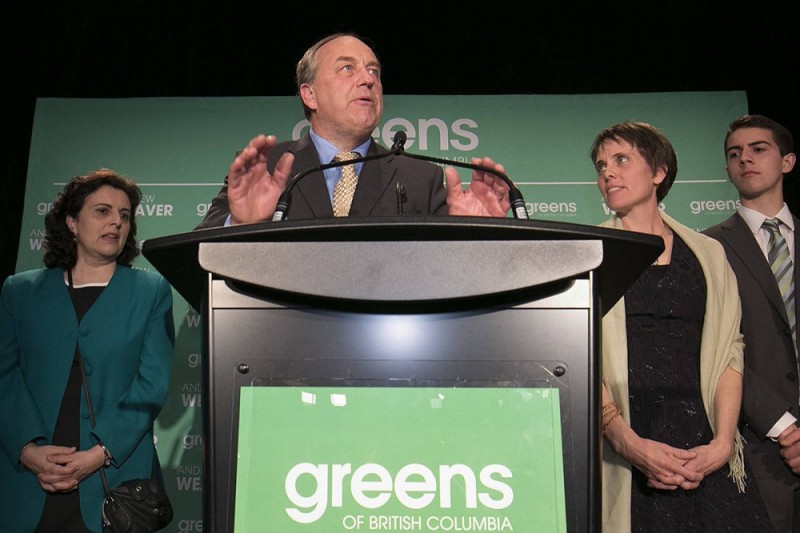BC Green’s anti-worker biases expose the party’s contradictions on climate change

BC Green Party Leader Andrew Weaver. Photo by Arnold Lim.
After making vague promises in its 2017 election platform to “modernize” provincial labour standards, the British Columbia Green Party recently blocked two important reforms to the province’s labour code, showing that, in practice, Canada’s mainstream Green movement harbours anti-worker biases that negatively impact the struggle against climate change.
As the first Green caucus in North America, BC’s provincial iteration of the federal party indicates what working people might expect from a Green federal government. Scrutinizing the party’s record on labour issues is especially important, since the federal Greens appear to be making electoral advances in social-democratic strongholds like Vancouver Island, where the Greens recently won a by-election, and where opposition to the Trans Mountain expansion project is generally strong.
BC’s three Green MLAs—who currently prop up the NDP government through a confidence and supply agreement—recently blocked a proposal to simplify the province’s union-certification process, and forced tighter restrictions on raiding periods for construction unions. Those actions showed the party poses risks to both workers’ interests and effective mobilizations against climate change.
First, the Greens blocked the reintroduction of the card-check union certification system, which allows workers to unionize if a majority of employees on a shop floor sign membership cards. This would have replaced the current two-step secret-ballot system, which experts like SFU professor Mark Leier say allows employers to drag out and interfere with union certifications: “[Employers] have no interest in democracy, what they are interested in doing is keeping unions out. And the single biggest, best way to keep a union out is to delay the process.”
Canadian Centre for Policy Alternatives contributors Bethany Hastie and Daniel Mare explained in a Policy Note article last year that BC’s current certification rules:
“Create significant barriers, especially for workers in precarious jobs, which are characterized by non-standard employment (part-time, casual or temporary work), low wages, a lack of benefits, poor working conditions and job insecurity—and which are disproportionately taken up by women, racialized minorities, recent immigrants and other marginalized individuals.”
By removing the secret-ballot step, card-check generally enables higher numbers of workers to unionize more quickly.
But Green leader Andrew Weaver made clear he would oppose the return of card-check as early as June 2017, while the NDP and Greens were still brokering the confidence and supply agreement. At that time, Weaver told the Vancouver Sun, “I will never support legislation that will eliminate the secret ballot.” Surprisingly, Weaver backed up his position by citing his experience as a member of the University of Victoria Faculty Association:
“I know from first-hand experience that in any certification drive there are those people who feel pressured to sign a certification drive, but they want the opportunity to have a secret ballot.”
University workers are among the most precarious and underpaid in the labour market. Data released by Statistics Canada last month revealed 26 percent of jobs in educational services last year were temporary, while the Federation of Post-Secondary Educators recently reported that one-third of all post-secondary instructors in BC are hired on short-term contracts. In other words, the university employees that Weaver once worked alongside are among those who would benefit the most from a less inhibitive union-certification process like card-check.
Notably, Green MLA Sonia Furstenau explicitly addressed the issues of “increasing precarity of jobs” and the “erosion of income security” for British Columbian workers during a speech in the legislature, before calling for “supports and protections” to help workers “navigate a rapidly transforming job market.” However, she too, along with Weaver and fellow Green MLA Adam Olsen, blocked the return of card-check, which would make it easier for precarious workers to organize and hold exploitative employers accountable.
Weaver later tried to justify his party’s position by arguing that “the overwhelming majority of British Columbians support the secret ballot.” Although he didn’t provide a source for that claim, the only recent public opinion poll that supports it was one conducted by One Persuasion, a polling company jointly run by Rebel Media co-founder and Conservative Party campaign manager Hamish Marshall.
Little wonder, then, the Greens’ obstruction of card-check received rounds of applause from anti-labour big business groups, including the Independent Contractors and Businesses Association, who hailed the “steadfast opposition to card check by the BC Greens and the BC Liberals.” The right-wing Fraser Institute, which regularly attacks labour unions, unsurprisingly agreed that Weaver was “right to oppose” the re-introduction of the one-step certification system.
Second, the BC Green caucus voted through a BC Liberal amendment blocking a measure that would make it easier for legitimate construction unions to raid members of employer-friendly unions.
Weaver’s comments on this issue were particularly troubling. Speaking in support of the Liberals’ amendment, which decreased raid periods from once every summer to once every three years, the BC Green leader said, “This is not about trying to create an us versus them — us versus CLAC [Christian Labour Association of Canada] or us versus Unifor or us versus the nurses. This is about recognizing that labour law must represent the diversity of views that are out there and be inclusive and respectful and grounded in evidence.”
Weaver’s suggestion that groups like the CLAC—an employer-friendly organization with a history of undermining minimum employment standards—should be given the same consideration as legitimate labour unions speaks to a deeper problem with the Green Party’s politics: their practical denial of the existence of class antagonisms, and their failure to recognize connections between labour struggles and the fight against climate change.
The BC Green Party’s 2017 election platform stated:
Today’s economy is subject to regular disruptions driven by technology, demographics and climate change. These forces cannot be averted through wishful thinking, but we can modernise labour laws to provide protection for the average British Columbian while still addressing this reality.
However, the party’s vague promise to “modernise” labour standards lacked substantive commitments beyond promising to “give greater flexibility and employment security to workers.” On the other hand, some of the manifesto’s other cornerstone economic pledges included “greening the economy, and promoting risk taking and innovation,” and vowing to implement a “more efficient tax system” in order to save “both government and businesses money.” This type of investor-centred rhetoric highlights the Greens’ core belief that fixing climate change—the party’s flagship policy area— is not a matter of overturning free-market capitalism, but of incentivizing ‘green capitalism.’
But as Guardian writer George Monbiot argued last month, “it is the system, rather than any variant of the system, that drives us inexorably towards disaster.” Trying to nudge the market towards more climate-friendly practices is doomed to fail, because such a project fails to address the fact that capitalism’s imperative towards perpetual growth and unlimited resource consumption is, as Monbiot put it, “incompatible with the survival of life on Earth.”
Instead of helping provide a basis for worker solidarity and grass roots mobilizations against the economic system that caused climate change, Green Party policies emphasize shallow concepts like “innovative enterprise” and “sustainable business.” The BC Greens use those buzzwords to distinguish themselves from other major political parties, but in practice such terms indicate the same thinly veiled pro-employer and pro-market biases as the neoliberal mainstream. If the federal Greens offer similar proposals in their 2019 election manifesto, working people need only look to BC to see what those policies look like in practice.
After his party forced regressive changes to BC’s modest labour reforms, Weaver said he felt that by reducing the number of raid periods, “we bring forward policy to this table that does create a fair, balanced, level playing field, grounded in evidence, not ideological or historical position.”
That rejection of “ideological” labour politics echoed Weaver’s previous criticisms, last year, of BC’s Community Benefits Agreements, which hired workers for public infrastructure projects on union-only contracts. Speaking in the legislature, the BC Green leader said:
It’s going back to fight the trade union wars of the early 20th century. Those wars were won. Let’s move on.
Weaver’s fundamentally conservative dismissal of the trade union movement as historically finished, and his claim that today’s legislators should treat labour issues in non-ideological terms, rings especially hollow given the fact that some labour unions are leading the way in forging alternatives to the climate catastrophe. For example, unions and other worker organizations have played important roles in initiatives like the Canadian Green New Deal project, which brings struggles for workers’ rights and the fight against climate change together in common cause. Although still in its early stages, the campaign proposes “rapid, inclusive and far-reaching transition” towards a “100% renewable economy based on public ownership and dignified, well-paying work.”
The Green New Deal doesn’t necessarily propose a complete systemic shift, but it does offer a decisive break from neoliberal orthodoxy and a more robust program for combating climate change than the weak, anti-labour reformism currently offered by the BC Green Party.
Alex Cosh is a writer and graduate student based in Powell River, British Columbia. He writes for PressProgress, and is the Opinions Editor at rabble.ca.










